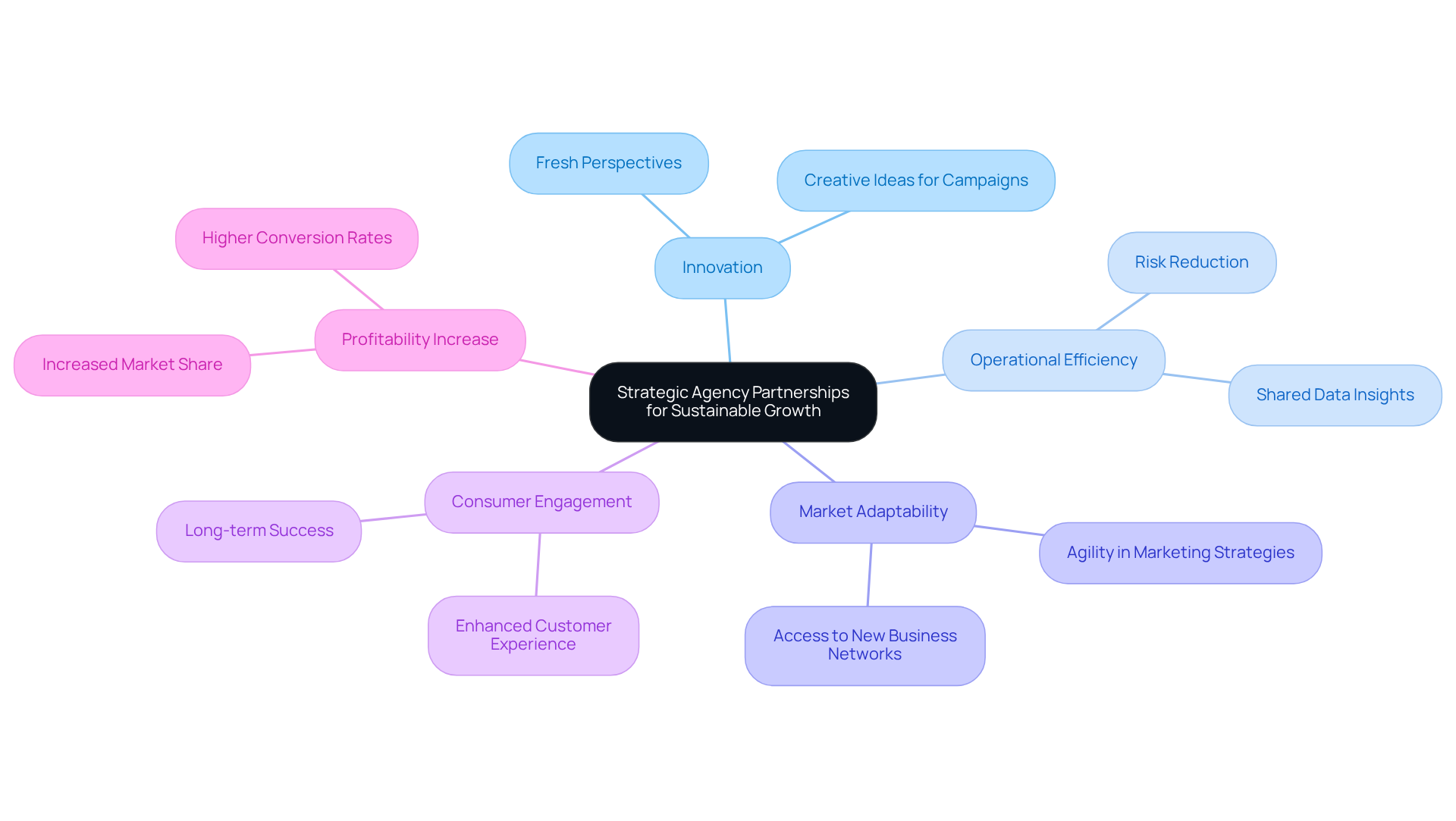
Overview
DTC brands require a digital agency to achieve ecommerce success. These agencies possess the essential expertise needed to navigate the complexities of digital marketing, optimize customer acquisition, and enhance operational efficiency. Strategic partnerships with digital firms can significantly improve client retention, reduce acquisition costs, and drive profitability. This assertion is backed by compelling case studies that demonstrate substantial increases in conversion rates and revenue.
By leveraging the knowledge and skills of digital agencies, brands can effectively tackle marketing challenges and streamline their operations. The data shows that companies that engage with these experts see marked improvements in their performance metrics. This not only fosters a more robust customer base but also ensures a sustainable path to growth.
In conclusion, DTC brands should actively seek out partnerships with digital agencies to harness their expertise. Doing so will not only enhance operational effectiveness but also position these brands for long-term success in the competitive ecommerce landscape.
Introduction
In the rapidly evolving landscape of direct-to-consumer (DTC) brands, the role of digital agencies has become increasingly vital for achieving eCommerce success. These specialized firms offer a wealth of expertise that not only enhances marketing effectiveness but also drives operational efficiency, enabling DTC companies to thrive amidst fierce competition. However, as customer acquisition costs soar and consumer expectations shift, the question arises: how can DTC brands leverage the strategic partnership of digital agencies to navigate these challenges and secure sustainable growth?
Understand the Essential Role of Digital Agencies in DTC Success
Digital firms are indispensable to the success of direct-to-consumer (DTC) labels, providing specialized knowledge that significantly enhances marketing effectiveness and operational efficiency. Acting as strategic partners, these agencies empower companies to navigate the intricacies of the digital landscape by leveraging data-driven insights to inform decision-making. Their extensive suite of services—including SEO, content marketing, social media management, and conversion rate optimization (CRO)—is crucial for amplifying visibility and driving sales. Notably, companies that utilize data to guide their decisions are:
- 23 times more likely to acquire clients
- Six times more likely to retain them
- 19 times more likely to achieve profitability as a result
Furthermore, digital firms assist DTC labels in crafting unified messaging and branding strategies that resonate with target audiences, fostering enhanced client engagement and loyalty. In a competitive market where 61% of consumers are more inclined to purchase from companies that offer innovative experiences, the ability to swiftly adapt to shifting consumer behaviors and preferences is paramount. Agencies are exceptionally equipped to facilitate this agility, owing to their profound understanding of market dynamics and consumer psychology. As DTC companies grapple with escalating client acquisition costs and evolving consumer expectations, collaborating with a digital firm becomes not only advantageous but essential for sustainable growth and success. For instance, an agency aided a DTC pet company in reducing acquisition expenses by 40% while simultaneously increasing lifetime value by 25%. Moreover, enhancing client retention rates by a mere 5% can elevate profits by 25% to 95%, underscoring the financial benefits of these collaborations.

Identify Key Challenges DTC Brands Face in 2025
In 2025, DTC brands face formidable challenges that threaten their growth and profitability. Chief among these is the escalating cost of client acquisition, which has surged due to intensified competition and saturation in digital advertising channels. For instance, the average customer acquisition cost (CAC) varies significantly across industries; in sectors like jewelry, costs can reach as high as $91, while those in food and beverage average around $53. This disparity underscores the urgent need for companies to optimize their acquisition strategies.
Moreover, many DTC brands are grappling with low conversion rates as consumers become increasingly discerning in their purchasing decisions. The complexity of managing multiple digital platforms exacerbates the situation, particularly due to the difficulties in tracking performance across these platforms with varying data sets and metrics. This reality necessitates a focus on personalized client experiences that align with evolving consumer expectations. Brands must ensure seamless interactions across various touchpoints to foster loyalty and drive sales.
These challenges highlight the critical importance of collaborating with a digital agency ecommerce, such as Parah Group. With a strong emphasis on Conversion Rate Optimization (CRO), Parah Group prioritizes profitability and sustainable growth, offering tailored strategies designed to enhance performance and drive conversions. By leveraging data-informed insights and innovative marketing strategies, DTC companies can navigate the complexities of the current landscape and effectively address the rising costs associated with customer acquisition.

Leverage Digital Agency Expertise to Overcome Challenges and Drive Growth
To navigate the complex challenges encountered by DTC companies, leveraging the specialized knowledge of digital firms like Parah Group can be transformative. For instance, a $30M apparel company partnered with Parah Group to address low conversion rates by redesigning their homepage to highlight social proof and reviews, resulting in a remarkable 35% increase in conversion rates and a 10% boost in revenue per visitor. Such case studies illustrate how organizations conduct comprehensive competitor evaluations, pinpointing market gaps and opportunities that allow companies to strategically position themselves. This insight is essential, particularly as 91% of companies report profitability from international sales, emphasizing how digital firms can enable this success through informed market positioning.
Additionally, agencies implement data-driven marketing strategies that optimize advertising spend and enhance targeting, effectively reducing customer acquisition costs. For example, Grab Green, a $15M revenue cleaning product company, experienced an 80% increase in average order value (AOV) after testing free shipping thresholds and introducing bundles. With increasing acquisition expenses being a major concern for DTC companies, these strategies are crucial for sustaining profitability.
Furthermore, organizations excel in creating persuasive conversion text and improving user experience through UI/UX design—both essential for boosting conversion rates. STRNG Seeds, a rapidly expanding DTC cannabis company, enhanced their AOV by 90% through custom landing pages and post-purchase upsells. A high conversion rate not only indicates client satisfaction but also reflects effective acquisition efforts, reinforcing the need for DTC companies to collaborate with firms. By employing ongoing A/B testing and utilizing client feedback, agencies can refine marketing strategies in real-time, ensuring companies remain agile and responsive to evolving consumer needs.
This cooperative strategy not only addresses urgent issues but also fosters enduring development by cultivating a devoted customer base and increasing market value. This is becoming increasingly significant as overall consumer loyalty has decreased from 77% in 2022 to 69% in 2024, highlighting the urgency for DTC companies to connect emotionally with consumers. In a landscape where price sensitivity and competition are intensifying, the strategic partnership with a digital firm like Parah Group becomes a key driver of sustainable success.

Achieve Sustainable Growth Through Strategic Agency Partnerships
Strategic collaborations with digital firms are vital for fostering sustainable growth among DTC companies. By partnering with organizations that possess a deep understanding of the unique challenges and objectives faced by these businesses, firms can tap into a wealth of expertise and resources that drive innovation and operational efficiency. Such alliances empower companies to remain agile, adapting their marketing strategies to align with evolving market trends and consumer preferences.
Digital agency ecommerce plays a crucial role in implementing scalable solutions that address shifting market dynamics, significantly reducing the risk of stagnation. This collaborative approach nurtures a culture of continuous improvement, allowing companies to explore new ideas and strategies without the burden of substantial financial risk. For example, companies that engage in agency partnerships have reported notable increases in profitability and market share, positioning themselves more competitively within the rapidly evolving DTC landscape.
Moreover, with 81% of consumers planning to make at least one DTC purchase in the next five years, the imperative for companies to innovate and enhance their customer engagement strategies is undeniable. By cultivating synergies through these partnerships, DTC brands can not only bolster their operational capabilities but also establish a solid foundation for long-term success in an increasingly competitive environment.

Conclusion
Digital agencies are indispensable to the success of direct-to-consumer (DTC) brands, acting as essential partners that expertly navigate the complexities of the digital marketplace. By leveraging their expertise in data-driven marketing strategies, these agencies empower DTC companies to enhance visibility, optimize customer acquisition, and cultivate brand loyalty. The collaborative efforts between DTC brands and digital agencies not only address immediate challenges but also lay the foundation for sustainable growth in an increasingly competitive environment.
Throughout this article, key insights illustrate how digital agencies effectively tackle significant hurdles faced by DTC brands, such as escalating customer acquisition costs and low conversion rates. By implementing tailored strategies that prioritize user experience and utilize market data, these agencies have proven their capability to drive remarkable results. Case studies underscore the tangible benefits, including reduced acquisition expenses and increased revenue per visitor, demonstrating the effectiveness of these strategic partnerships.
As the landscape continues to evolve, the imperative for DTC brands to innovate and adapt cannot be overstated. Engaging with a digital agency transcends mere tactical decision-making; it is a strategic necessity that can lead to enhanced operational efficiency and improved customer engagement. By embracing these partnerships, DTC brands position themselves for long-term success, ensuring they remain agile and responsive to shifting consumer behaviors and market dynamics.
Frequently Asked Questions
What role do digital agencies play in the success of direct-to-consumer (DTC) brands?
Digital agencies are essential for DTC brands as they provide specialized knowledge that enhances marketing effectiveness and operational efficiency, helping companies navigate the digital landscape through data-driven insights.
What services do digital agencies offer to DTC brands?
Digital agencies offer a range of services including SEO, content marketing, social media management, and conversion rate optimization (CRO), which are crucial for increasing visibility and driving sales.
How does data-driven decision-making impact DTC companies?
Companies that utilize data for decision-making are 23 times more likely to acquire clients, six times more likely to retain them, and 19 times more likely to achieve profitability.
How do digital agencies help with branding and messaging?
Digital agencies assist DTC brands in creating unified messaging and branding strategies that resonate with target audiences, leading to improved client engagement and loyalty.
Why is agility important for DTC brands in the current market?
Agility is crucial because 61% of consumers prefer to purchase from companies that offer innovative experiences, requiring DTC brands to adapt quickly to changing consumer behaviors and preferences.
What financial benefits can DTC brands gain from collaborating with digital agencies?
Collaborating with digital agencies can lead to reduced client acquisition costs and increased customer lifetime value. For example, an agency helped a DTC pet company reduce acquisition costs by 40% while increasing lifetime value by 25%.
How significant is client retention for DTC brands?
Enhancing client retention rates by just 5% can increase profits by 25% to 95%, highlighting the financial advantages of focusing on customer retention strategies.
FAQs











